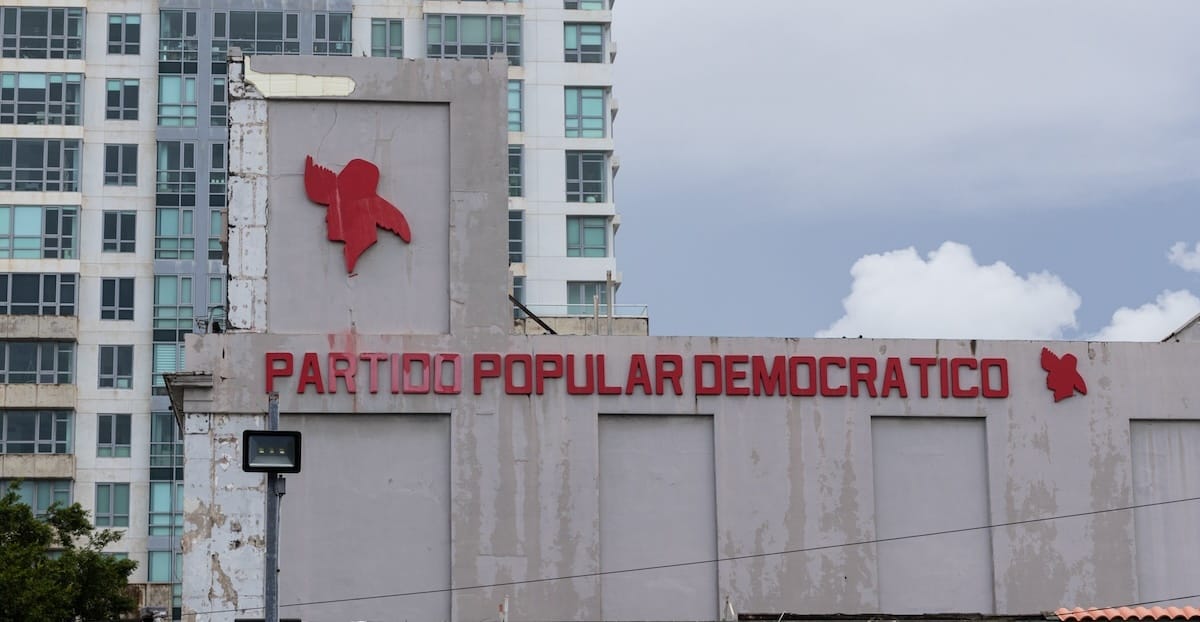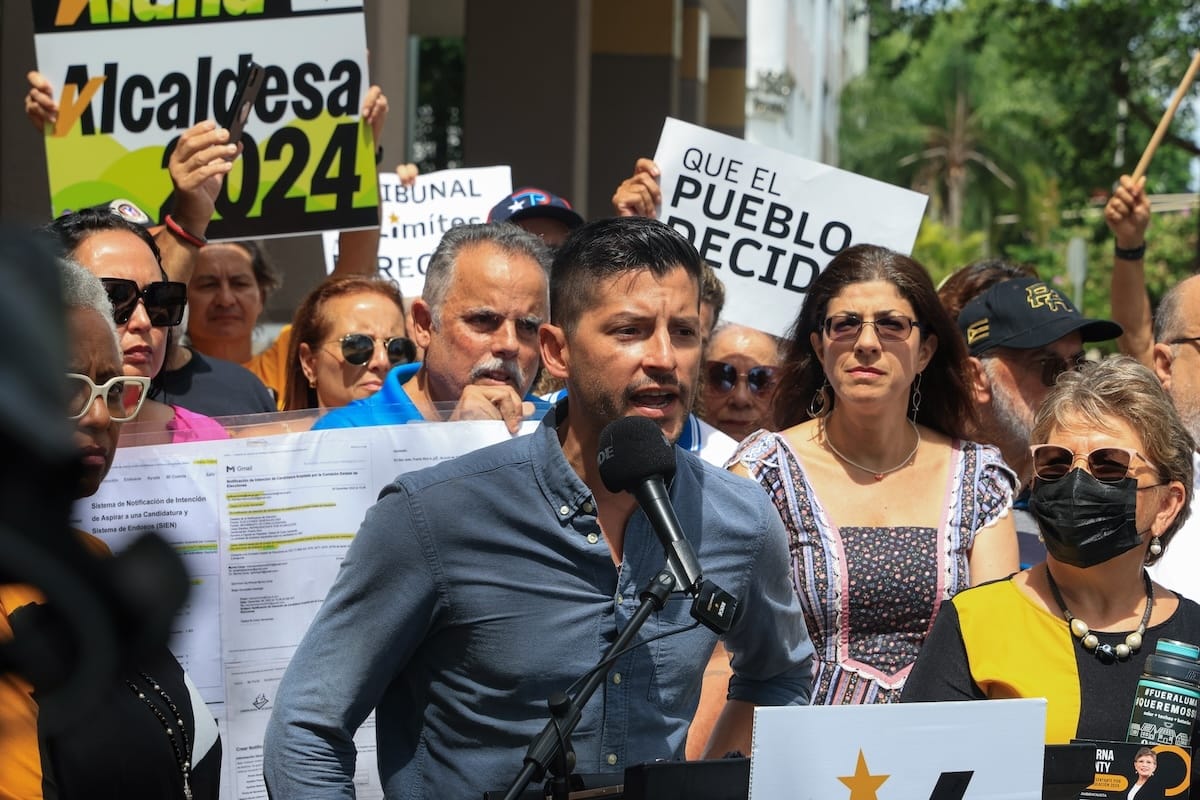
Photo of PPD headquarters in San Juan, Puerto Rico (Carlos Berríos Polanco/The Latino Newsletter)
SAN JUAN — The pro-commonwealth Popular Democratic Party (PPD) has spent more years in the governor’s seat than any other political party in Puerto Rico.
However, recent polling placed their candidate third in the 2024 governor’s race, 10 points behind their long-term rival the pro-statehood New Progressive Party (PNP) and the newly booming Puerto Rican Independence Party (PIP), which has created a center-left La Alianza (the alliance) with the Citizens Victory Movement (MVC) party.
While polls are not perfect representations of the electorate, the results came as a shock to a system that has long been controlled by either the PNP or the PPD.
“We do not believe there is a gap to close between the PPD and La Alianza. But the PPD is sharing a contrasting message, as a centrist party against a left-wing alliance and a Trumpist PNP,” Pablo José Hernández, PPD candidate for resident commissioner, a non-voting representative for Puerto Rico in Congress, told The Latino Newsletter in a written statement.
The PNP’s candidate for governor, current resident commissioner Jenniffer González Colón, is a registered Republican. She endorsed Trump in 2020, although she said earlier in January that she didn’t support Trump for the 2024 Republican nomination when Nikki Haley was still in the GOP race. González has criticized Trump in the past, but at the RNC in July, she said that Trump’s record shows that he is “the best option” not only for Latinos, but also for Puerto Ricans.
The resident commissioner represents Puerto Rico in Congress. The position does not have a Congressional vote and is considered the running mate of Puerto Rico’s governor during the campaign season.
For the PPD, Hernández is slated on the same ticket as Jesús Manuel Ortiz, the party’s gubernatorial candidate.
Even though Hernández acknowledges that both his party and the PNP have lost “about the same amount” of votes since 2012, he believes that this upcoming election will be similar to the 2020 elections. That one turned into a tight contest between the PPD and the PNP. He explained that he recognized the “dissatisfaction” within the party caused by corruption scandals and internal division, which is what motivated him to step up to run in this election.
The PNP narrowly won the 2020 governor’s election with 33% of the vote, a slim 1.5% margin over the PPD. Meanwhile, the PIP and the MVC, a new party formed in 2019, gathered around 28% of the vote combined, which would set the stage for their current 2024 progressive alliance.
A PPD Falloff?
Manuel Natal, La Alianza’s candidate for mayor of San Juan and MVC co-founder, attributes the falloff in support for Puerto Rico’s traditional bipartisanship to the parties choosing to compete with each other for votes, instead of focusing on attracting new voters. As the PNP and PPD started to resemble each other more and more, it left segments of their voter base anchorless within those parties, Natal explained.

Manuel Natal (Carlos Berríos Polanco/The Latino Newsletter)
“The performance of these political parties led to lots of people either leaving the electoral process or looking for alternatives. Then, those alternatives started popping up, adjusting, and perfecting their proposal for the country and I believe the arrival of the MVC changed the game completely,” Natal told The Latino Newsletter over the phone.
Natal was a PPD congressman from 2013 to 2018 when he disaffiliated from the party and became a legislator with no party until he co-founded the MVC.
The partisan politics of the United States do not map cleanly onto Puerto Rico’s political landscape. Instead, most of the political parties revolve around Puerto Rico’s status, whether to become a state (PNP), continue the Commonwealth (PPD), or become independent (PIP). Natal attributes the support the MVC has received to not being laser-focused on the status issue, instead focusing on broad issues that affect their supporters.
The most recent poll had Natal in second place for San Juan mayor and the PNP candidate in first place, while the PPD’s candidate came in fourth place, behind the “not sure” option. Meanwhile, in the resident commissioner race, Hernández placed third and La Alianza’s candidate placed fourth, both behind the “not sure” option, which came in second place.
“We are sure the PPD is not third,” Hernández said in the same written statement to The Latino Newsletter. He questioned the methodology of the polling of these surveys, pointing at perceived errors in the surveyed population.
A PPD Sticking Point
As for the governor’s race, whether to continue fielding Ortiz as the main PPD candidate for governor has seemingly become a sticking point for party members. Two PPD mayors told El Nuevo Día that the Ortiz candidacy was “deflated.” In contrast, Senate President José Luis Dalmau Santiago rebuffed those statements and said that what the PPD needs is for their registered voters who did not vote for them in the last election to vote for them this year.
Hernández tamped down any seeming fissures within the party, saying “the party is united behind him.”
The Senate President’s task could be difficult as more voters seemingly align themselves with La Alianza, instead of the PPD. For example, Rafael Cox Alomar, the party’s 2012 resident commissioner candidate, recently sat side-by-side with PIP advisors during a press conference announcing their initiative for a Puerto Rico status conference.
“People are tired of the same thing,” pensioner Eduardo Quiles told The Latino Newsletter after a small MVC community outreach meeting in Trujillo Alto. He voted for the PPD in 2016, but he moved towards the MVC after they were founded in 2019. The bipartisan system of the PNP and PPD either has one vote for the “bad one or the less bad one,” he explained.
This year, Quiles said he will be supporting La Alianza’s candidates.
About the Author
Carlos Berríos Polanco is a journalist from Puerto Rico covering climate, conflict, and the intersection of the two.
